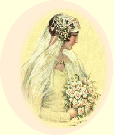In this novel Jane Austen focuses
on the upper class in the early nineteenth century and carried out several
issues of the upper class. What we focus on here is the relationship between
the two issues of "entail"
and
"marriage
and money".
"There
are not many in my rank of life who can afford to marry without
some attention to money." --- Colonel Fitzwilliam
"An Entail
was a legal device used to prevent a landed property from being broken
up, and/or from descending in a female line." ('Entail
and Inheritance', Notes on Education, Marriage, Status of Women, etc. Pride
& Prejudice Hypertext. http://www.pulpit.org/Samples/money_grab.htm)
Conventionally, entail went to
sons, and daughters could only depend on a wealth husband to ensure their
life with fortune. At that time most women were not allowed to work and
earn money by themselves. Even though there were few occupations for women,
such as being a governess, women with such occupations were often not respected
and couldn't have good working condition. It was almost impossible for
the upper class ladies to "step
out into the society" and earn their own living. Therefore, "marriage
is pretty much the only way of ever getting out from under the parental
roof..." ('Marriage and the Alternatives: The
Status of Women', Notes on Education, Marriage, Status of Women, etc. Pride
& Prejudice Hypertext), and "husband-hunting"
became
very important to single women. Another important concept in this period
was the relationship between marriage and status. A successful marriage
was a perfect match of social status, and had a lot to do with property,
money, and inherited estate. Men were looking for beautiful women with
good family connections; women were using every possible "skills"
to get husbands with good fortune. Marriage became a game of hunting; or
worse, "marriage is a market, and the young women
were its merchandise." (Ginger Grab, Money
& Marriage.http://www.pemberley.com/jameinfo/pptopicz.htm/#entail)
-
How does such
background influence the two proposals of Mr. Collins and Mr. Darcy to
Elizabeth in Pride and Prejudice?
Mr. Collins' list of reasons
for proposal is the best proof of regarding marriage as merely the business
transaction. It perfectly shows the reality of marriage market. As for
Darcy, although he proposes to Elizabeth out of love, yet like Mr. Collins,
his economical and social consideration for Elizabeth makes him assume
that it will be impossible to get severe rejection.
-
But does marriage
only have to do with social status, property and appropriate class?
Such idea was exactly what Jane Austen
criticized. Women shouldn't just be the merchandise in marriage market;
their intelligence and good sense should bring them happiness in marriage.
In Pride and Prejudice, Elizabeth is the representative of this idea. "The
problem that Jane Austen sets up in this novel is how is Lizzy to maintain
her integrity and find happiness in this savage environment, and on a thematic
level, how is love possible in a ruthless, money and status-oriented society?"
(Ginger
Grab, Money & Marriage) In spite of the
mercenary and husband hunting in that society, Elizabeth insists to remain
true to her feelings and her intelligence. However, she's too confident
of herself and it makes her unaware of her false judgment. Her great prejudice
blinds her and leads her fail to see the truth. This is the lesson that
she's going to learn ultimately.
What
follow are the deeper discussions of the two proposals and Elizabeth's
judgment.
 The
comparison of two proposals we have read The
comparison of two proposals we have read
 Elizabeth's
judgments Elizabeth's
judgments
|



